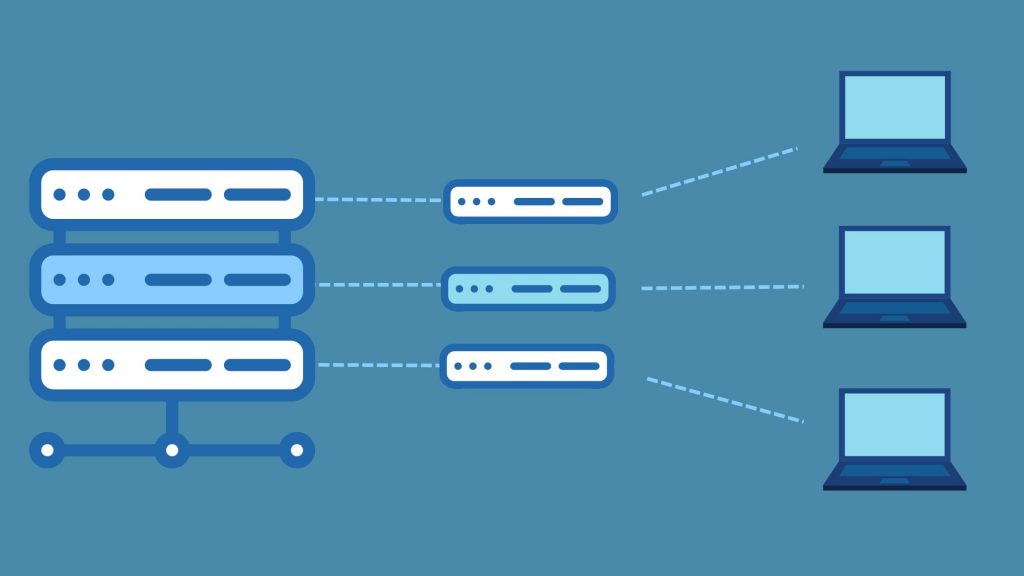Hello there, fellow website enthusiasts!
Today, we’ll dig into the intriguing world of web hosting and learn about the crucial components that bring websites to life on the huge internet. You’re in for a treat if you’ve ever been curious about the technical brilliance that underlies websites and how the world can access them.
What is Web Hosting
Fundamentally, web hosting is a service that gives people and organizations the room and resources they need to store the files, information, and material for their websites on a potent computer known as a server. This server makes sure that your website is accessible to users around-the-clock because it is always linked to the internet.
Types of Web Hosting
There are various forms of web hosting, each of which meets certain demands and specifications:
Shared Hosting
Picture a friendly community where many homes are located on the same street. A single server houses numerous websites that share its resources under shared hosting. It’s an economical choice for newcomers and small organizations, although peak performance could be impacted by shared resources.
Advantages:
- Easy to set up
- Cheap monthly or annual fees
- Built-in database software and site builder
- Capacity to host multiple sites on a single account
Disadvantages:
- Less control of the server configuration
- With growing traffic, the cost may rise to

VPS Hosting (Virtual Private Server)
Imagine living in a gated neighborhood where each home has a private space and exclusive resources. VPS hosting gives you more control, customization, and speed than shared hosting because your website is hosted on a virtual space within a larger server.

Advantages:
- Excessive customization
- Dedicated server space
- Root access included
Disadvantages:
- Technical knowledge required
- More expensive than shared hosting
Dedicated Hosting
Dedicated hosting is like owning your own mansion if shared hosting is like an apartment building. Here, you receive a complete server that is dedicated to your website alone, providing top speed, increased security, and total management. Large-scale websites with high traffic levels are best suited for dedicated hosting.
Advantages:
- Complete hold and control of the server configuration
- High reliability
Disadvantages:
- Expensive
- Users need to have high technical knowledge to operate

Reseller Hosting
Reseller hosting is a type of web hosting where the account holder can host websites for other people using their given hard drive space and bandwidth. The ‘reseller’ in this case is the owner of the original hosting account. When the purchased space is not needed and some of the allocated resources can be shared with another party, reseller hosting is advantageous. Sharing resources like disk space, bandwidth, and CPU while earning a consistent income.
For entrepreneurs interested in this business model, hosting companies provide tailored reseller hosting plans. Anyone who owns many domains will benefit from purchasing a reseller hosting service. You can create your own hosting plans that give the resources allotted to your websites or those of your customers.
Advantages:
- Easy to set up
- Cheap monthly or annual fees
- Built-in database software and site builder
- Capacity to host multiple sites on a single account
Disadvantages:
- Less control of the server configuration
Cloud Hosting
The newest hosting model to enter the market, cloud hosting, has exploded in popularity in recent years. This kind of hosting utilizes numerous connected web servers to provide a cost-effective, scalable, and stable web infrastructure. The reason why so many huge enterprises are moving to the cloud is because cloud hosting plans often offer unmetered, dependable bandwidth and an indefinite quantity of disk space for unlimited domains. It’s a good way to manage a website that uses a lot of resources or has a lot of content assets, like photographs, but the cost can be very high.
Advantages:
- Great reliability and availability
- High flexibility
- Increased security
- Automatic data backup and scales up and down depending on the requirement
Disadvantages:
- Expensive
- Root access not provided
How Does Web Hosting Work
A user only needs to enter your domain name (URL) into their web browser to view your website. The server that hosts your website receives a request from the browser. The user’s browser then receives the pertinent files and data, including HTML, pictures, videos, and other material, from the server. Users can access your website immediately thanks to this quick, flawless process that takes place in only a few milliseconds.
Key Features to Consider
Selecting the right web hosting service involves considering various factors, such as:
Storage Space: Determine how much disk space your website needs to store all of its media files.
Bandwidth: Check that your hosting package has enough bandwidth to handle both incoming and outgoing traffic to your website. Inadequate bandwidth may cause delayed page loading times or even outages during periods of high demand.
Control Panel: A control panel’s function is to allow you to handle various parts of your website’s hosting account yourself. A commercial host should have a control panel so that you may perform routine maintenance activities without having to wait for technical support to make minor changes. A ‘cPanel’ is a simple interface that allows you to handle email addresses, account passwords, and basic server settings. Going through a technical support operator or being forced to pay an additional cost each time you want to execute simple administrative tasks can be time-consuming.
Uptime Guarantee: Choose a hosting company with a reliable uptime guarantee. The proportion of time that your website will be continuously accessible to users is known as uptime. For a dependable online presence, look for a hosting company that has a 99.9% uptime guarantee at the very least.
Technical Specifications: In addition to selecting hosting services with sufficient bandwidth, processing power, and disk space, you should search for additional options that make your website operate more efficiently.
Our servers at Dhaka Web Host Ltd. run on CloudLinux, and to speed them up, we use LiteSpeed technology.
Upgrade Options: Most website owners begin with a shared hosting package, but as their websites’ demands increase, they may eventually need to upgrade to a VPS or dedicated server. In this situation, choosing a hosting provider with upgrade choices that are easier to understand is recommended.
Reviews: Read reviews of website hosting that go into great detail about various web hosting companies. You will be able to observe how the provider’s servers truly operate because the majority of internet reviews include data on uptime and speed.
24/7 Customer Support: Round-the-clock If your website has unforeseen slowness, crashes, or even security breaches, customer or technical assistance is useful. Check to see if the host also offers assistance tools like knowledge bases and tutorials.
Security Measures: Choose a hosting company that places a high priority on website security because the internet can be harmful. Your website will be protected from potential dangers by features like SSL certificates, firewalls, and frequent website backups.
Refund Policy and Guarantees: Even the best service providers might experience problems. Therefore, it’s crucial to have an SLA that includes a money-back guarantee or refund if the provider doesn’t deliver the uptime promised while managing a significant website. For instance, we, Dhaka Web Host Ltd. offer a 30-day money-back guarantee, meaning that if the consumer cancels the service during this time, they will receive a full refund.
Difference between Web Hosting and Domain Name
You must first do a domain name search and then purchase a domain name in order to launch your website. Don’t worry if you don’t know about domain names yet, read this “What is a Domain Name“. Hosting and a domain are the two most crucial requirements for publishing a website. Despite their differences, they are equally important. A domain name serves as the official website’s digital identification, making it possible for users to quickly visit your website, while hosting is utilized to store data on your website.
A domain name typically consists of the name of your website and a domain extension, such as the popular.com,.net, or.org. There are other additional options, as well as fresh names like.xyz.
Buying hosting and a domain separately or from the same vendor are both options. a few service companies.
You can see our other blogs also
Bottom Line
In conclusion, web hosting is the foundation of your online presence since it offers a safe and dependable environment for your website to flourish. You are better able to choose the ideal hosting provider for the particular requirements of your website if you are knowledgeable about the subtleties of web hosting. Web hosting is essential to shaping your digital success, whether you’re beginning a personal blog, an online store, or a professional portfolio.
So, armed with this newfound information, step into the web hosting industry and build a name for yourself online! Happy hosting and may the internet world be kind to your website.

